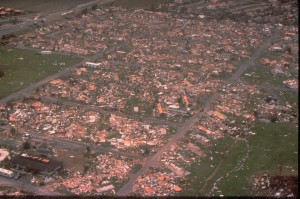
Twenty-two years ago Hurricane Andrew devastated extreme south Florida, even leading to the relocation of the National Hurricane Center away from the coast.
But I would argue that, unless 9 year olds are now building on the beach and insurers have decided that hurricanes are no longer a threat, Floridians haven’t forgotten. How can anyone forget 2004 and 2005, with 7 hurricanes hitting Florida, unless they are only 9 years old?
And are 1 million new residents moving to Florida since then really that clueless about hurricanes? Have people moving to Kansas not heard of tornadoes?
It is rare that any given midwestern town is hit by a tornado. But everyone understands that the threat is there. Eventually, another one will hit. So, when there’s a tornado watch, people pay attention.
And when it’s hurricane season, people pay attention. Especially if they have never experienced one before.
When the next hurricane threatens Florida, people will be so inundated with media-hyped warning of just how bad it might get that, if anything, Floridians will be too responsive.
The bigger threat in my mind is over-warning when weak hurricanes hit. This is what happens with tornado warnings, and it also happens with hurricanes. Over-warning leads people to skip evacuations, or to not head to an interior room or a basement.
So, unlike Mr. Samenow, I’ll take the old-fashioned view that fewer hurricane strikes are a good thing…and that people aren’t stupid.

 Home/Blog
Home/Blog



